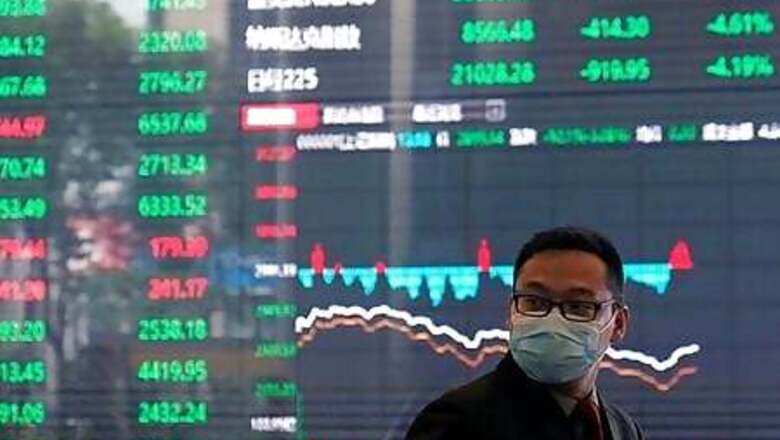
views
LONDON World stocks ended four days of gains on Friday after U.S. President Donald Trump cranked up antagonism with Beijing by banning U.S. transactions with two popular Chinese apps: Tencent’s WeChat and ByteDance’s TikTok.
With second quarter GDP data showing double digit percentage declines for major economies that may be the worst hits from the coronavirus lockdowns, investors were looking forward to other factors like the U.S. presidential vote and China-U.S. trade.
“Historical data show equities perform less well when the incumbent party loses and the president is not re-elected and the odds of this happening have increased significantly in recent months,” said Jeroen Blokland, portfolio manager at Robeco, of the upcoming U.S. election.
“What is more, Trump might revert to more drastic policies or statements to try to gain in the polls. Today’s banning of Tencent’s WeChat, in addition to TikTok, might be an example of this.”
Chinese stocks led losers in Asia and its currency slumped after Trump issued executive orders to purge “untrusted” Chinese apps from U.S. digital networks.
MSCI’s broadest index of world stocks deepened losses, down more than 1% after four days of gains. Still, it was around 3% away from a late February peak.
“The U.S. pressure on China’s tech sector appears likely to continue in the presidential elections, injecting volatility in the sector and opening the door to escalatory retaliation,” UBS strategists said.
European stocks also suffered with major indexes down between 0.2% to 0.4%.
Latest Bank of America fund flow statistics also confirmed the undercurrent of caution in global markets with investors flocking to cash, gold and investment-grade bonds and switching out of equities.
Asia-Pacific shares outside Japan fell 1%, with mainland Chinese indexes down more than 1% each, even though Chinese trade data for July showed exports beat expectations.
DOLLAR STRONG
Risk appetite was subdued on Friday with hopes fading for a quick deal by U.S. policymakers on stimulus worth at least $1 trillion to support the fragile economy. The White House and Democrats remained far apart on the size of the stimulus package and what to include.
The risk-off mood pushed U.S. Treasury yields lower and offered a brief respite to the struggling dollar, which has been under pressure in recent weeks. The 10-year U.S. Treasury yield dipped 1.1 basis points to 0.5198%, near Thursday’s five-month low of 0.504%.
In currency markets, the dollar rebounded smartly from more than two-year lows hit in the previous session against its rivals with riskier currencies like the euro and the Aussie dollar falling more than half a percent each.
Closely watched U.S. non-farm payrolls data, due at 1230 GMT, is expected to show an increase of 1.58 million in July, compared with 4.8 million in June.
Gold hit a record high of $2,075.2 per ounce XAU= before succumbing to profit-taking to slip to $2,063.
Silver dropped 1.7% to $28.452 per ounce following its rise to a seven-year high of $29.838.
Oil prices were little changed, with Brent futures down 0.1% at $45.04 per barrel.
Disclaimer: This post has been auto-published from an agency feed without any modifications to the text and has not been reviewed by an editor




















Comments
0 comment